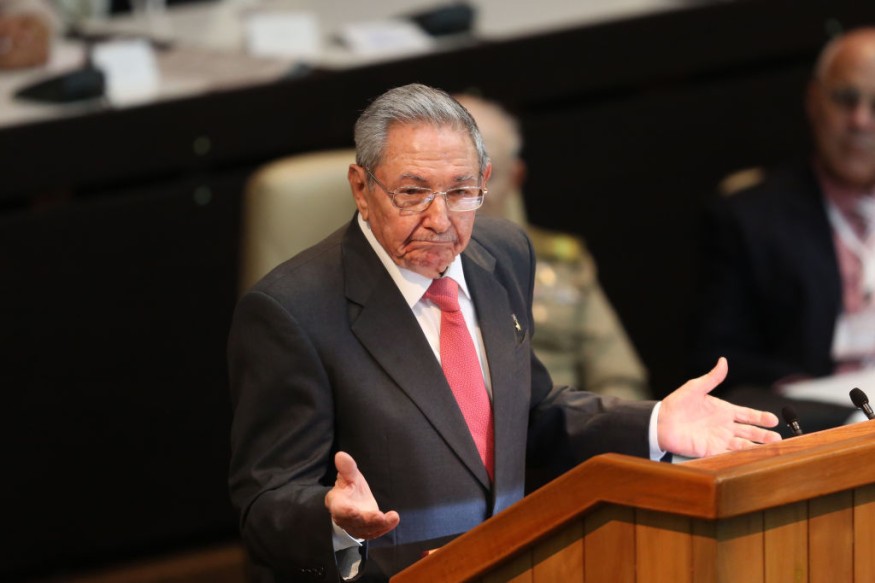Raul Castro Steps Down as Cuba's Communist Party Leader

Raul Castro announced Friday that he is resigning as Cuba's Communist Party head, ending an era of leadership by him and his brother Fidel Castro that started with the 1959 revolution.
Raul Castro said that he was retiring with a sense of having fulfilled his mission and was confident in the future of the country, according to an Associated Press report. The 89-year-old Castro added that no one forced him to make the said decision.
"As long as I live I will be ready with my foot in the stirrup to defend the homeland, the revolution and socialism with more force than ever," Castro said at the opening of the eighth Congress of the one ruling party aired on state television.
Raul Castro did not say who he would be endorsing as his successor. However, he indicated that he favors giving up the Communist Party's first secretary position to 60-year-old Miguel Diaz-Canel.
Diaz-Canel succeeded him as president in 2018 and is seen as the standard-bearer of a younger generation of loyalists, who favor opening up the economy without affecting Cuba's one-party system, CBS News reported.
The official handover of power to the first non-Castro Communist Party of Cuba (PCC) first secretary is expected on the final day of Congress next Monday. The said position is the most powerful position in Cuba.
Diaz-Canel is expected to become Cuba's first civilian for the position since the Castro-era leadership began, and he will remain Cuban president.
Many expected the change, with one retiree, Juana Busutil, saying that one has to step aside for the young people. However, many are anxious about what will happen to Cuba's economy with the pandemic, financial reforms, and certain restrictions that the Trump administration imposed.
READ NEXT: Trump Would Be Wrong to Reset U.S.-Cuba Policy
Cuba Amid the Pandemic
Cuba's economy had declined by 11 percent last year, which is the worst economic plummet since 1993 in the country of 11.2 million residents. Despite the salary increase, it was not enough to make up for the price inflation, AFP News reported.
During his resignation announcement, Raul Castro also denounced the U.S.'s economic war against his country, citing sanctions that he claimed to have sought to strangle the country's economy and trigger a "social explosion."
According to Castro, the administration of former U.S. President Donald Trump has imposed over 240 sanction measures on Cuba to intensify the economic blockade.
Meanwhile, the dollar is back in the country for the first time since the fall of the Soviet Union. Cubans with access to dollars were able to buy higher-quality products. The island's cash crisis was brought by the pandemic, according to The Guardian report.
Oscar Fernández, professor of economics at the University of Havana, said that they are at crossroads where there is no other way out.
"The state is looking for alternatives so it can keep buying food and medicine," Fernandez said in a report.
Cuba last opened dollar stores as an emergency stopgap during the so-called Special Period in 1993. Dollars were taken out of circulation and replaced by the CUC in 2004.
Raul Castro Leadership
Raul Castro succeeded Fidel Castro as head of the party in 2011. Cuba was ruled before by Fidel Castro from 1959 to 2006 when he fell ill.
Raul Castro played second-string to his brother Fidel Castro for most of his life. He first became a guerrilla commander and later as a senior figure in their socialist government.
However, Raul Castro was the face of communist Cuba and its defiance of U.S. efforts to oust its socialist system for the past decade.
Fidel Castro, who died in 2016, was still considered the country's father and savior. He led the revolution that drove dictator Fulgencio Batista from power in 1959, became head of the party in 1965, and officially embraced socialism four years after.
Norman McKay, an analyst with The Economic Intelligence Unit, said that the absence of Raul Castro in the political realm does not necessarily mean that there will be an abrupt change in the Communist Party style.
In May 2019, a new constitution was passed stating that Cuba's commitment to socialism was "irrevocable."
The Communist Party is composed of some 700,000 activists tasked in Cuba's constitution with directing the affairs of the country and society.
READ MORE: New Prime Minister of Cuba Annointed, the First Since 1976
WATCH: Raul Castro Steps Down as Head of Cuba's Communist Party - From CNBC Television
Subscribe to Latin Post!
Sign up for our free newsletter for the Latest coverage!

















